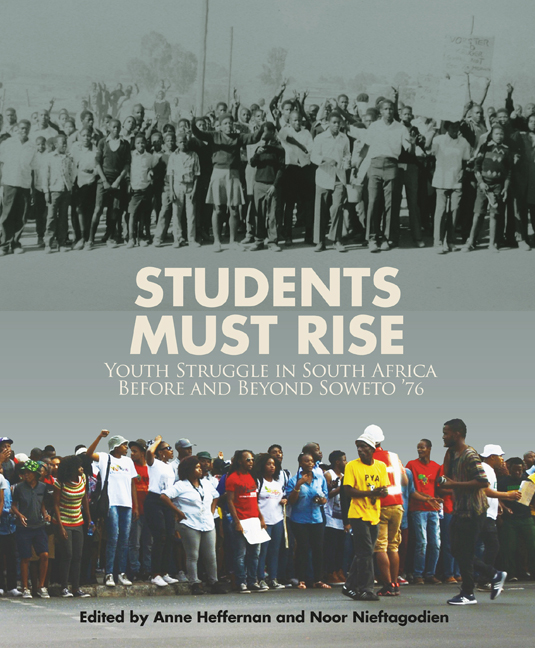Book contents
- Frontmatter
- Acknowledgements
- Contents
- Timeline
- Map Of South Africa
- Glossary
- Abbreviations
- Introduction: narratives of the student struggle
- Chapter 1 A brief history of the African Students’ Association
- Chapter 2 Youth and student culture: Riding resistance and imagining the future
- Chapter 3 The role of religion and theology in the organisation of student activists
- Chapter 4 Student organisation in Lehurutshe and the impact of Onkgopotse Abram Tiro
- Chapter 5 The University of the North: A regional and national centre of activism
- Chapter 6 Action and fire in Soweto, June 1976
- Chapter 7 What they shot in Alex
- Chapter 8 SASO and Black Consciousness, and the shift to congress politics
- Chapter 9 Youth politics and rural rebellion in Zebediela and other parts of the “homeland” of Lebowa, 1976–1977
- Chapter 10 My Journey, our journey: Activism at Ongoye University
- Chapter 11 ‘Let's begin to participate fully now in politics’: Student politics, Mhluzi township, 1970s
- Chapter 12 ‘They would remind you of 1960’: The emergence of radical student politics in the Vaal Triangle, 1972–1985
- Chapter 13 The ends of boycott
- Chapter 14 Fighting for ‘our little freedoms’: The evolution of student and youth politics in Phomolong township, Free State
- Chapter 15 ‘Every generation has its struggle’: A brief history of Equal Education, 2008–15
- Chapter 16 Contemporary student politics in South Africa: The rise of the black-led student movements of #RhodesMustFall and #FeesMustFall in 2015
- Selected Bibliography
Chapter 10 - My Journey, our journey: Activism at Ongoye University
Published online by Cambridge University Press: 21 April 2018
- Frontmatter
- Acknowledgements
- Contents
- Timeline
- Map Of South Africa
- Glossary
- Abbreviations
- Introduction: narratives of the student struggle
- Chapter 1 A brief history of the African Students’ Association
- Chapter 2 Youth and student culture: Riding resistance and imagining the future
- Chapter 3 The role of religion and theology in the organisation of student activists
- Chapter 4 Student organisation in Lehurutshe and the impact of Onkgopotse Abram Tiro
- Chapter 5 The University of the North: A regional and national centre of activism
- Chapter 6 Action and fire in Soweto, June 1976
- Chapter 7 What they shot in Alex
- Chapter 8 SASO and Black Consciousness, and the shift to congress politics
- Chapter 9 Youth politics and rural rebellion in Zebediela and other parts of the “homeland” of Lebowa, 1976–1977
- Chapter 10 My Journey, our journey: Activism at Ongoye University
- Chapter 11 ‘Let's begin to participate fully now in politics’: Student politics, Mhluzi township, 1970s
- Chapter 12 ‘They would remind you of 1960’: The emergence of radical student politics in the Vaal Triangle, 1972–1985
- Chapter 13 The ends of boycott
- Chapter 14 Fighting for ‘our little freedoms’: The evolution of student and youth politics in Phomolong township, Free State
- Chapter 15 ‘Every generation has its struggle’: A brief history of Equal Education, 2008–15
- Chapter 16 Contemporary student politics in South Africa: The rise of the black-led student movements of #RhodesMustFall and #FeesMustFall in 2015
- Selected Bibliography
Summary
I had said I wasn't gonna’ write no more poems like this.
But the dogs are in the streets.
It's a turn around world where things all too
quickly turn around.
It was turned around so that right looked wrong.
It was turned around so that up looked down.
It was turned around so that those who marched
in the streets
with bibles and signs of peace became enemies
of the state
and risks to National Security;
so that those who questioned the operations of
those in authority
on the principles of justice, liberty and equality
became the vanguard of a communist attack.
from A Poem for Jose Campos Torres by Gil Scott-HeronWhen I arrived at the University of Zululand, popularly known as Ongoye (or Ngoye) University, in 1982, I was feeling proud of myself because although I was an older student – having already completed a four-year General Nursing and Midwifery Diploma at Edendale College – I was choosing education instead of a salaried nursing job. The excitement of being a full-time student suggested unending possibilities for me. In 1984 when I was expelled and I left the university without having completed my degree, I was even prouder of myself than when I started, but the reason was different – I had stood up for what I believed was right; I had followed my conscience – my political conscience.
In order to better understand what happened in Ongoye in the early 1980s it becomes important to look at the broader geographical area and understand its politics. As students at the university we were not immune to the influences of our surroundings. We analysed them, reacted and actively responded to them and in turn also contributed to them by creating what we believed was right. As students at the university we also all had our individual pasts. Pasts that had moulded us as groups and as individuals in one way or the other. Pasts we had moulded in individual and collective chosen ways.
So who was I politically? What had influenced me before going to Ongoye University that made me choose to be a student activist? The politics of Natal (now KwaZulu- Natal) – where I was born and bred – has had a long history, but I will focus only on the period that shaped me. Put differently, what I allowed to shape me.
- Type
- Chapter
- Information
- Students Must RiseYouth struggle in South Africa before and beyond Soweto ’76, pp. 119 - 127Publisher: Wits University PressPrint publication year: 2016



